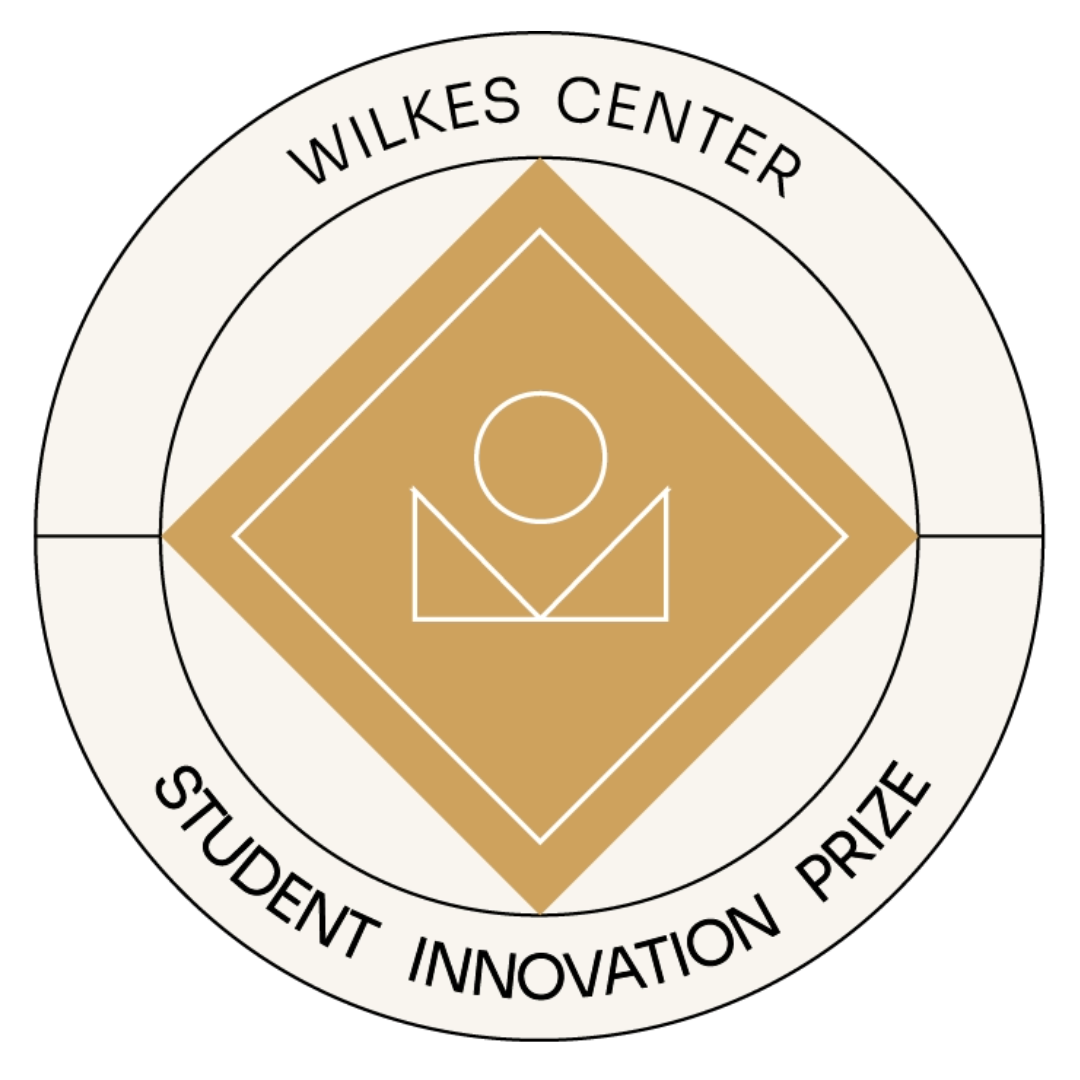
Harnessing the Best and Boldest Ideas from University Students Statewide to Tackle Climate Change
Meet the Winners for the 2024 Wilkes Center Student Innovation Prize
We are excited to announce the winners of this year’s Student Innovation Prize for Climate Solutions!
This year university students across the state of Utah were invited to submit their most innovative, creative, and bold ideas for tackling climate change. Applicants were encouraged to detail how their ideas could be rapidly scaled and have an innovative impact for mitigating climate change, along with feasibility and potential for co-benefits to people and/or ecosystems.
More details about the winning teams will be included here soon.

Conscious! is an app and Chrome extension that gives you real time, holistic sustainability metrics and lower carbon alternatives for the products you are already shopping for. With Conscious! you can scan a product's barcode for its sustainability profile, search through our database of third-party vetted products, or just shop online as you normally would and let our Chrome extension provide you with lower carbon alternatives. Our mission is to close the information gap between producers and consumers and empower our users to vote with their dollars for a better world. Conscious! is hard at work and hopes launch by the end of the year.
Hannah Rogers
Undergraduate, Environmental & Sustainability Studies, Geography
Hannah is a geography and sustainability studies major at the University of Utah graduating this spring. She has worked for a climate lobbying organization–Citizens’ Climate Lobby–for two years where she developed and led several environmental campaigns. Hannah is grateful to experience the inspiration, peace, and joy of the natural world; her passion for the earth drives her career and ambitions.
Frances Benfell
Undergraduate, Economics, Political Science
Frances is an Honors student double majoring in political science and economics at the University of Utah graduating in December 2024. She is the co-chair of the legislative team of the Utah Chapter of the Sierra Club and has spent two years lobbying and researching environmental legislation with the organization. Frances has also participated in multiple government internships and local electoral campaigns. She plans to become an environmental lawyer and will start law school in the fall of 2025.
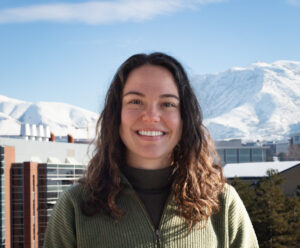 Sara McCormack
Sara McCormack
Graduate Research Assistant, Department of Chemistry, University of Utah
Redox flow batteries are a promising technology for grid-scale energy storage but are currently lacking in commercial viability due to the use of costly, rare-metal-based materials. This research will use machine learning to build an improved understanding of molecular features that contribute to positive battery performance metrics, allowing for the design of more efficient organic energy storage materials and increasing their commercial viability.
Sara is a third-year PhD candidate working with Professor Matthew Sigman. Her research focuses on the computational parameterization of small organic molecules and experimental assay development to evaluate and improve the performance of grid-scale energy storage technologies. She is interested in the application of machine learning algorithms to better understand challenging chemical problems, particularly those relating to innovative energy-storage solutions.
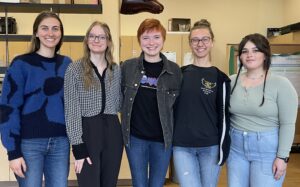 The WRC emerged as a product of the 2024 Wilkes Center Hackathon, which was dedicated to exploring resilience amidst escalating wildfires. The mission of the WRC is to provide a framework and funding for incorporating many voices of underserved and underrepresented communities to collaborate and assist one another in the development and implementation of projects focused on bolstering community resilience to wildfire.
The WRC emerged as a product of the 2024 Wilkes Center Hackathon, which was dedicated to exploring resilience amidst escalating wildfires. The mission of the WRC is to provide a framework and funding for incorporating many voices of underserved and underrepresented communities to collaborate and assist one another in the development and implementation of projects focused on bolstering community resilience to wildfire.
Tegan Lengyel
Graduate, Biology
Hannah Meier
Graduate, Ecology and Evolutionary Biology
Rebecca Senft
Graduate, Ecology, Evolutionary and Organismal Biology
Rebecca received here BS in Plant Biology from Kennesaw State University, where her interest in ecological research began. During her undergraduate degree, she worked on several projects that explored anthropogenic change's impact on plants. In her graduate studies, Rebecca works with Dr. Luiza Aparecido to investigate how global change stressors, such as heat and drought, interact with invasive species. This work includes interdisciplinary collaborations to create realistic land management recommendations.
Elizabeth Williams
Undergraduate, Biomedical Engineering
Annie Carlile
Graduate, School of Biological Sciences (EEOB)
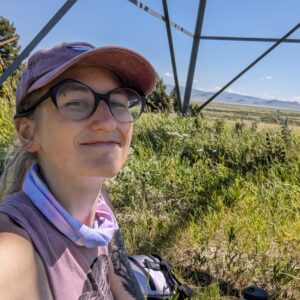 Esther Mathieu
Esther Mathieu
Graduate, Environmental Humanities
The Cool Campus Initiative is a proposal for an integrated, interconnected series of interventions that collectively address extreme heat, air quality, and mental wellbeing. Each intervention taken independently has the potential to address serious environmental issues on campus, but together they form a holistic system, each element sustaining and strengthening the impacts of the others.
My proposal is composed of three interventions:
- A free bike share program offering infinitely renewable 48-hour bike loans through UCard access that, following a successful pilot period at the University of Utah campus, could be expanded through the GREENBike system or independently across Salt Lake City, providing alleviation of air quality, traffic congestion, fossil fuel consumption, and emotional distress
- Reflective treatments of campus hardscapes to raise albedo and decrease temperatures under extreme heat
- Botanical islands across campus to address air quality, student mental health, water retention, and light pollution
Working in network these programs could reemphasize each other’s impacts, creating real change for the University of Utah’s population of students, staff, faculty, visitors, and non-human creatures, and modeling holistic, design-oriented solutions to climate problems.
Bio:
Esther Mathieu is an artist and writer from Queens, NY. Their academic work focuses on wetland ecologies, Mad studies, and design. As a Mellon Community Engagement Fellow, Esther has worked with ASSIST Community Design Center on storytelling projects and with a group of local artists to create the Imagining Futures artist book. Esthers work spans media and disciplines and is primarily interested in ecologies, mythologies, queer and disabled identities, and notions of place. They have served as a Floyd O'Neil Fellow, an Episcopal Ecojustice Fellow, and Artist in Residence at the Taft Nicholson Center, and their written and artistic work has been featured in various print and digital publications. Their collage work will be exhibited in a solo show at the Anderson Foothill Library opening June 20, 2024.
About the 2024 Student Innovation Prize
Our Call to Action
Tackling climate change is one of the defining issues of the 21st century. Climate solutions hold immense potential to drive a sustainable, prosperous, and equitable future for people and communities in the US and around the globe. We conceive of climate solutions broadly, including entrepreneurial and technological innovations as well as new policies and programs. Universities can serve as incubators for climate solutions and foster student innovation around scalable, timely, and impactful solutions.
ALL students enrolled at any university or college in the state of Utah are eligible to submit their most innovative, creative, and bold ideas for tackling climate change. Student Innovation Prize submissions should detail the scalable and innovative impact for mitigating climate change, feasibility, and potential for co-benefits to people and/or ecosystems.
Logistics
- $40,000 total in prizes:
- $20K first prize
- $10K second prize
- two $5K Third prizes
- Open to ALL currently enrolled students (undergraduate & graduate students) at the following universities and colleges in Utah:
Submission:
- 4-5 page (single spaced, minimum font size 12 and 1” margins. Figures should be inline with the text, and are considered part of the page limit while the bibliography is not part of the page limit).
- Innovative climate solutions pitches by individuals or teams (maximum of 5 people per team).
- Submissions should address all three criteria of scalable impact, feasibility, and other benefits and include a section on background and expertise of team members. If relevant for the solution, the submission may include a short business plan.
- DUE by 5:00 PM MDT on Thursday, February 29, 2024.
- Enter your contact information below to begin the submission process.
- You must email your submission to Kyla Welch, at kyla.welch@utah.edu
- The subject of your email should be "Student Innovation Prize submission"
- Winners will be announced and required to present at the Wilkes Summit at the University of Utah, May 14 and 15, 2024.
- Questions: Contact Kyla Welch, Programs Manager (kyla.welch@utah.edu) or Ross Chambless (ross.chambless@utah.edu)
Key considerations for each criteria:
Scalable impact:
- How much greenhouse gases (million tons CO2-equivalent) could be avoided from emissions or removed from the atmosphere per year in the immediate future (e.g. 2023-2025) and near-term future (e.g. around 2030)?
- What are the potentials for scaling up the proposed climate solution over the 2030-2050 timescale?
- How is the proposed climate solution innovative or transformative?
Feasibility:
- Are there demonstrations of feasibility existing? At what stage? Where?
- If applicable to your solution, what is your plan to fund or finance the solution as you scale up?
- Explain why you or your team has the relevant expertise and structure to succeed.
- What are key barriers and what plans are in place to overcome barriers, constraints, risks, or trade-offs with scaling up the solution?
Co-benefits
- Will the proposed solution lead to other benefits to communities, economies, or ecosystems? Examples benefits other than greenhouse gas reductions could include benefits to public health, biodiversity, air quality, etc. What is the potential for negative consequences (e.g. on vulnerable communities, economies, or ecosystems) and what are solutions to mitigate them?
Who is qualified to submit an idea for the Prize?
Any currently enrolled student at a Utah-based university or college is edible.
If I win am I expected to actually implement my proposal?
The winning submissions should be feasible and have a concrete plan. Although we don’t currently have an expectation for a concrete deliverable after the award has been given the Wilkes Center team may be able to help connect the winners with resources to help them carry out their ideas.
What are the formatting requirements?
Please see the logistics explanation on the main page. PDF, 4-5 pages (single spaced, minimum font size 12 and 1” margins. Figures should be in line with the text, and are considered part of the page limit while the bibliography is not part of the page limit).
How should a team submit their proposal?
If you are submitting as a team only one team member needs to upload the file for the team.
When will winners be announced?
By the end of March 2024. The awarded teams will then need to present a 2-minute summary of their climate solution at the Wilkes Summit on May 14 and 15, 2024.
Post Award Requirements
The winning teams or individuals must meet with Wilkes Center staff for a brief interview and to take a photo. (This will be fun and easy, we promise!)
Is this award considered a scholarship or grant?
No, the award is a cash prize distributed directly to the winners.
Do I have to have a team to apply?
No, you do not have to be in a team to apply. You may submit your idea either as an individual or as a team.
How will the prize be dispersed if the winning submission is a team?
If a group of students win, the prize money will be evenly split between the members of the team.
Who do I contact for questions?
Contact Ross Chambless (ross.chambless@utah.edu), the Wilkes Center Community Engagement Manager, and he will respond to you as soon as possible.
Meet the Finalists for the 2023 Wilkes Center Student Innovation Prize
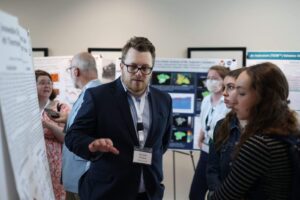 Nicholas Witham
Nicholas Witham
Graduate Research Assistant Electrical & Computer Engineering
This project proposes a novel renewable energy system that generates power via the daily heating and nightly cooling of the earth, known as the diurnal temperature variation. This can be accomplished using a type of artificial muscle known as a twisted coiled polymer actuator, which can be designed to either contract or expand when heated.
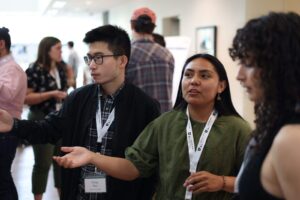 Samantha Eddy
Samantha Eddy
Undergraduate, Architectural Studies
Xiang Huo
Graduate, Department of Electrical and Computer Engineering
This project aims at building a self-sustained and eco-friendly living prototype that ensures passive survivability for the Diné residents by taking a Dennehotso, a Navajo chapter, as a pilot site to illustrate the design. It proposes to develop a holistic solution that incorporates modularized components to decarbonize the tribal land. Serving as a template project for decarbonizing rural communities, this project strives to improve the well-being of the Diné community by offering a holistic infrastructural and cultural solution that ensures net-zero carbon emissions.
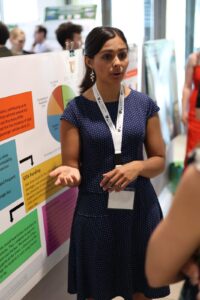 Audri Yasmin Dara
Audri Yasmin Dara
Undergraduate, Material Science Engineer and Philosophy
This project proposes the University of Utah reduce the need for students to commute by car to campus by investing in the Utah Transit Authority in order to improve bus service to the campus. The proposal also includes incentivizing students to use public transit by creating some type of rewards system.
Steven Tran
Graduate, Electrical & Computer Engineering
Md. Rabiul Hasan
Graduate, Electrical & Computer Engineering
This project proposes a new method for more accurately and efficiently measuring soil organic carbon content by using a UV-based, in-situ sensor network. These sensors can by used to more effectively track soil organic carbon content over time, which is necessary to understand trends.
